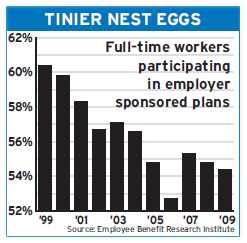Participation in Employer Sponsored Retirement Plans Falls
One big trend is: no job, no 401(k). But even among the employed, participation is down.

Profit and prosper with the best of Kiplinger's advice on investing, taxes, retirement, personal finance and much more. Delivered daily. Enter your email in the box and click Sign Me Up.
You are now subscribed
Your newsletter sign-up was successful
Want to add more newsletters?

Delivered daily
Kiplinger Today
Profit and prosper with the best of Kiplinger's advice on investing, taxes, retirement, personal finance and much more delivered daily. Smart money moves start here.

Sent five days a week
Kiplinger A Step Ahead
Get practical help to make better financial decisions in your everyday life, from spending to savings on top deals.

Delivered daily
Kiplinger Closing Bell
Get today's biggest financial and investing headlines delivered to your inbox every day the U.S. stock market is open.

Sent twice a week
Kiplinger Adviser Intel
Financial pros across the country share best practices and fresh tactics to preserve and grow your wealth.

Delivered weekly
Kiplinger Tax Tips
Trim your federal and state tax bills with practical tax-planning and tax-cutting strategies.

Sent twice a week
Kiplinger Retirement Tips
Your twice-a-week guide to planning and enjoying a financially secure and richly rewarding retirement

Sent bimonthly.
Kiplinger Adviser Angle
Insights for advisers, wealth managers and other financial professionals.

Sent twice a week
Kiplinger Investing Weekly
Your twice-a-week roundup of promising stocks, funds, companies and industries you should consider, ones you should avoid, and why.

Sent weekly for six weeks
Kiplinger Invest for Retirement
Your step-by-step six-part series on how to invest for retirement, from devising a successful strategy to exactly which investments to choose.
More evidence that Americans aren't saving enough for their retirement: Workers' participation in 401(k)s is down, both in absolute terms and as a share of the workforce. After hitting a high of 54.6 million full-time workers in 2000, participation slipped to 48.4 million last year, according to research by the Employee Benefit Research Institute (EBRI).
The number is expected to continue to drop. By 2012, only about 50% of workers will be taking part in the employer sponsored plans, down from 54.4% this year and 59.8% in 2000.
Unemployment is weighing heavily on workers' ability to save for retirement. The number of workers participating in employment-based retirement plans hit its lowest level since 1997. This is largely attributable to the decline in the number of workers as unemployment hovers around 10%.
From just $107.88 $24.99 for Kiplinger Personal Finance
Become a smarter, better informed investor. Subscribe from just $107.88 $24.99, plus get up to 4 Special Issues

Sign up for Kiplinger’s Free Newsletters
Profit and prosper with the best of expert advice on investing, taxes, retirement, personal finance and more - straight to your e-mail.
Profit and prosper with the best of expert advice - straight to your e-mail.
A decline in the availability of employer sponsored plans is another cause. Just 61.8% of employers offered plans to full-time employees last year, compared with 68.6% in 1999. Many private sector employers have done away with traditional defined benefit pension plans, and in the recent recession, many have frozen or cut matching contributions, reducing the incentive to participate.
"This trend has important implications for workers, since having more opportunities to participate in an employment-based retirement plan greatly increases the amount of money a retiree is likely to have in retirement," says Craig Copeland, senior research associate at EBRI.
On the bright side, the number of hardship withdrawals and loan requests remains steady. Neither is expected to grow significantly over the next year, demonstrating the commitment of participants to stay the course in saving for retirement.

Still, lawmakers are worried. Sen. Tom Harkin (D-IA), chairman of the Senate Committee on Health, Education, Labor and Pensions, is promising a hard look next year at the impact of firms shifting from defined benefit to defined contribution plans. "We are facing a future where no one other than the rich will have the opportunity for a safe and secure retirement," he said at a committee hearing in October.
"People that work hard for their entire lives will find themselves teetering on the brink of poverty, unable to pay the basic costs of living," he said. "That is going to have drastic consequences for families and our country as a whole."
But solutions will likely be elusive. One proposal, by Sen. Jeff Bingaman (D-NM) and Rep. Richard Neal (D-MA), would require employers to put up to 3% of workers' pay in an IRA if employees aren't offered an employer sponsored plan. Republicans will fight the proposal, arguing that it would be burdensome to small businesses.
The problem will also complicate discussions over larger retirement issues, including the already thorny subjects of Social Security and Medicare benefits. It's clear that "the system is failing many Americans, and that the 'three-legged stool' of retirement security -- private pensions, personal savings and Social Security -- has gotten awfully wobbly," Harkin said at the October hearing.
Profit and prosper with the best of Kiplinger's advice on investing, taxes, retirement, personal finance and much more. Delivered daily. Enter your email in the box and click Sign Me Up.

-
 Betting on Super Bowl 2026? New IRS Tax Changes Could Cost You
Betting on Super Bowl 2026? New IRS Tax Changes Could Cost YouTaxable Income When Super Bowl LX hype fades, some fans may be surprised to learn that sports betting tax rules have shifted.
-
 How Much It Costs to Host a Super Bowl Party in 2026
How Much It Costs to Host a Super Bowl Party in 2026Hosting a Super Bowl party in 2026 could cost you. Here's a breakdown of food, drink and entertainment costs — plus ways to save.
-
 3 Reasons to Use a 5-Year CD As You Approach Retirement
3 Reasons to Use a 5-Year CD As You Approach RetirementA five-year CD can help you reach other milestones as you approach retirement.
-
 Humanoid Robots Are About to be Put to the Test
Humanoid Robots Are About to be Put to the TestThe Kiplinger Letter Robot makers are in a full-on sprint to take over factories, warehouses and homes, but lofty visions of rapid adoption are outpacing the technology’s reality.
-
 Trump Reshapes Foreign Policy
Trump Reshapes Foreign PolicyThe Kiplinger Letter The President starts the new year by putting allies and adversaries on notice.
-
 Congress Set for Busy Winter
Congress Set for Busy WinterThe Kiplinger Letter The Letter editors review the bills Congress will decide on this year. The government funding bill is paramount, but other issues vie for lawmakers’ attention.
-
 The Kiplinger Letter's 10 Forecasts for 2026
The Kiplinger Letter's 10 Forecasts for 2026The Kiplinger Letter Here are some of the biggest events and trends in economics, politics and tech that will shape the new year.
-
 Disney’s Risky Acceptance of AI Videos
Disney’s Risky Acceptance of AI VideosThe Kiplinger Letter Disney will let fans run wild with AI-generated videos of its top characters. The move highlights the uneasy partnership between AI companies and Hollywood.
-
 AI Appliances Aren’t Exciting Buyers…Yet
AI Appliances Aren’t Exciting Buyers…YetThe Kiplinger Letter Artificial intelligence is being embedded into all sorts of appliances. Now sellers need to get customers to care about AI-powered laundry.
-
 What to Expect from the Global Economy in 2026
What to Expect from the Global Economy in 2026The Kiplinger Letter Economic growth across the globe will be highly uneven, with some major economies accelerating while others hit the brakes.
-
 The AI Boom Will Lift IT Spending Next Year
The AI Boom Will Lift IT Spending Next YearThe Kiplinger Letter 2026 will be one of strongest years for the IT industry since the PC boom and early days of the Web in the mid-1990s.